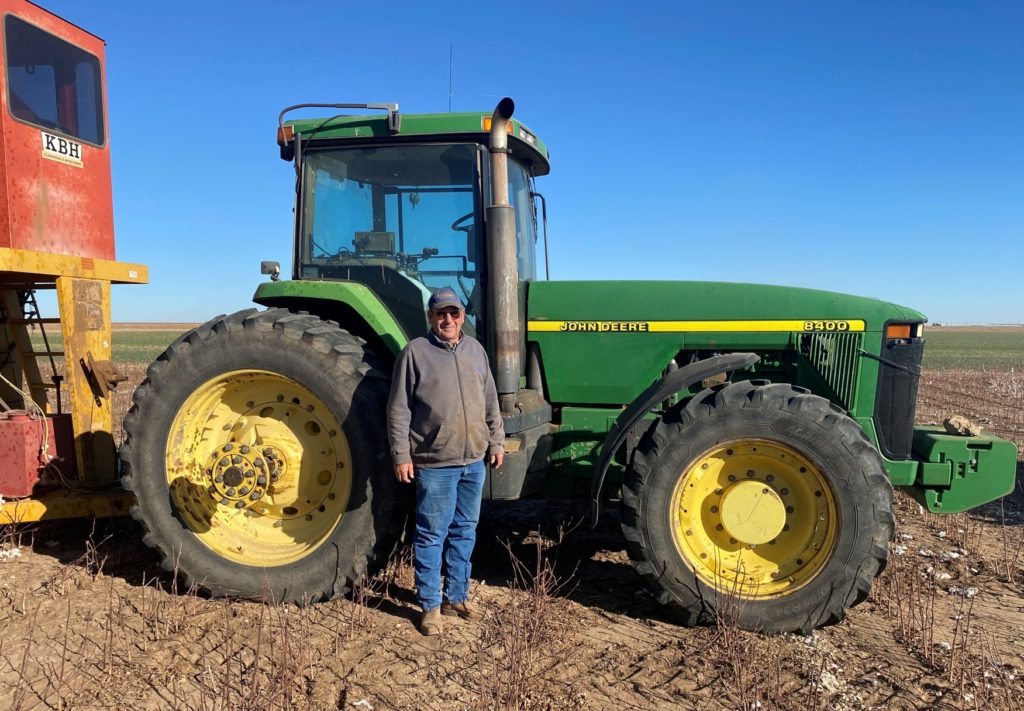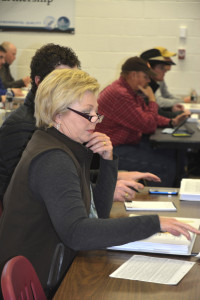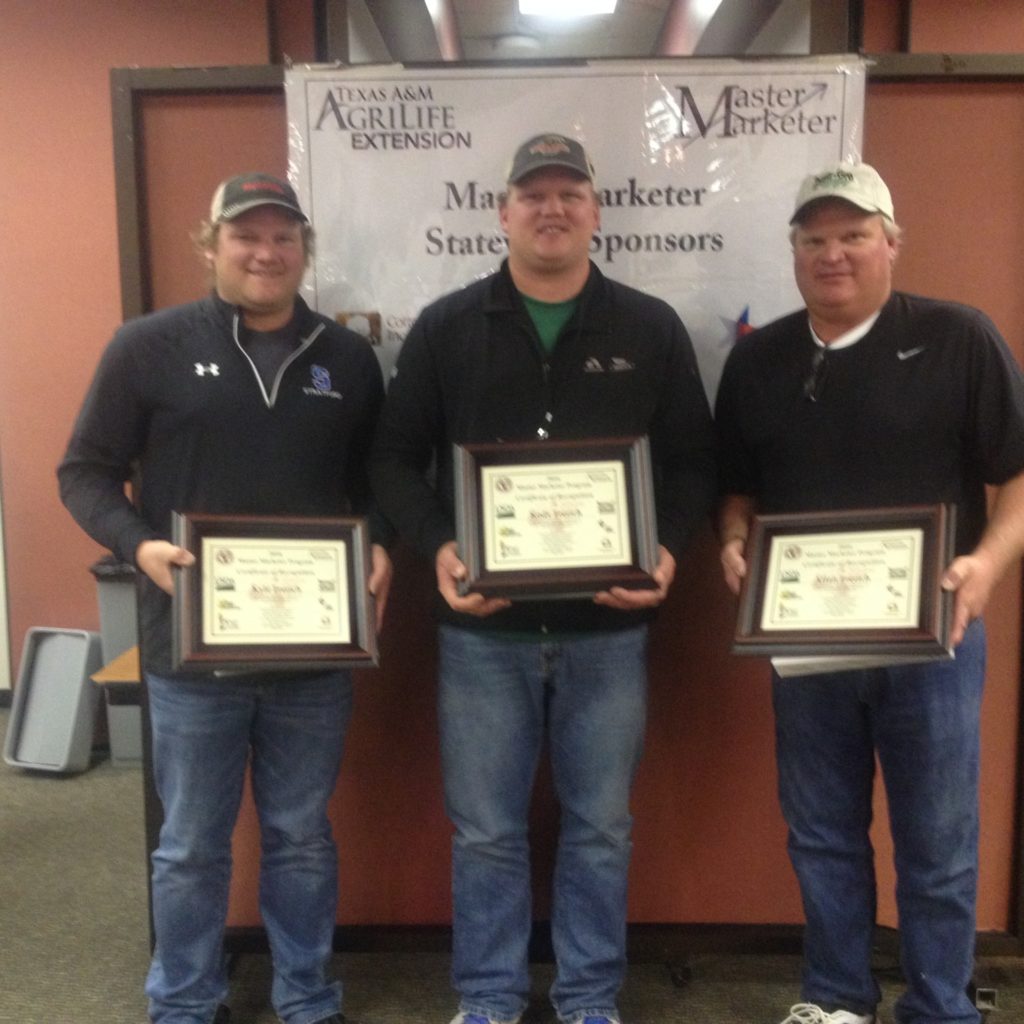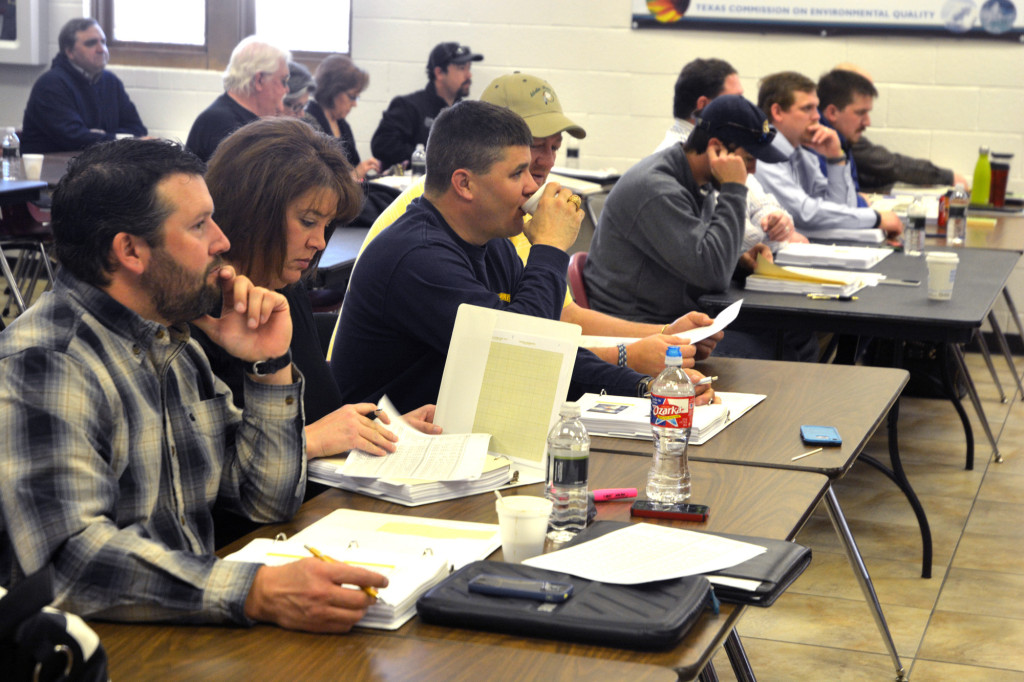Master Marketer program helps farmers, ranchers reduce risk, increase profits
Program attendees benefit from broader marketing knowledge through intensive, focused training
Ray Schlabs, a Deaf Smith County farmer, knows the decisions he makes for his operation may not all be perfect, but he feels more comfortable making them by applying the knowledge he gained from the Master Marketer program.

“I can say what I have learned in the Master Marketer program has been worth at least $30 to $50 an acre improvement to me,” he said. “And while that doesn’t always mean pure profit, at least it means that in lean years, my losses will be less.”
Schlabs isn’t alone.
Since 1996, the Master Marketer program, developed by the Texas A&M AgriLife Extension Service and the Department of Agricultural Economics at Texas A&M University, has helped agricultural producers reduce risk and gain more profit from their farm and ranch operations.
Master Marketer events are held annually in different parts of Texas. So far, more than 1,200 participants throughout the state have graduated from the 32 programs provided. The next Master Marketer program is slated for January 2022 in Amarillo.
What is the Master Marketer program?
“The Master Marketer program is designed for agricultural producers and agribusiness leaders experienced in marketing commodities and having some knowledge of futures and options markets,” explained Mark Welch, Ph.D., AgriLife Extension economist, Bryan-College Station. “It provides 64 hours of intensive marketing training focusing on cotton, grains and livestock.”
Welch said since the inception of the program, producers reported a 132% increase in the adoption of a marketing plan. They also reported a 540% increase in the adoption of a written plan by those who indicated they had conceived developing a marketing plan for their operation.
“In the Master Marketer program, attendees are trained in marketing techniques, marketing plans, technical analysis, futures and options, and other marketing-related skills,” he said. “The program gives them a set of skills that become a marketing ‘toolkit’ they can use to make important business decisions relating to their agricultural business.”
The training includes not only timely outlooks and market information but also fundamental techniques for marketing beyond the current crop or livestock year.
“The overall objective of the program is to help attendees learn how to reduce risk and get more profit from their farm or ranch operation,” he said. “Program participants report increased financial returns to their farming and ranching operations as well as an increased understanding of risk management concepts.”
A post-graduation survey of graduates from the first 27 Master Marketer trainings showed an average increase on returns of about $35,000 annually for their operations.
Attendees receive more than just financial benefits, Welch added.
Impressions from program participants
While he has been to numerous programs over the years, Schlabs, a cotton, grain and silage farmer from Hereford, took the virtual Master Marketer training offered earlier this year.
“I’ve been to several of these programs, and the information I’ve gotten there has helped me gain the self-discipline to do the research necessary to make educated decisions relating to my farm,” Schlabs said. “It taught me how to get a broader view of the grain market and to understand pricing opportunities and how to use futures, options and formal contracts to my advantage.”
He said the program was invaluable in helping him understand and evaluate market technicalities, fundamentals and seasonality, and merge them to make informed decisions for his operation.
“The quality of the instruction and type and amount of knowledge I gained in the program was so good that I recommended it to my son and son-in-law, who are both involved in production agriculture.”
Another supporter of the program is Steve Alsabrook, a cotton and grain farmer from Haskell who attended Master Marketer trainings in Vernon and Abilene. He said the program has helped show him how to mitigate market risk.
“I learned a lot about options, futures and contracts, and how the market works,” Alsabrook said. “It showed me both the technical and fundamental aspects of the market and how the volatility in the market can affect your decision-making.”
He said although no one can completely predict what will happen in the agricultural commodities markets, the program provided him with the knowledge and tools to make educated market-related decisions with a minimum of risk.

Janet Tregallas, a multigeneration cotton, grain and cattle producer in Booker, has attended four Master Marketer trainings.
“I found the program to be beneficial and have gotten something out of each one I’ve attended,” she said. “The presenters have all been top-notch and are among the best in their field from throughout the entire country.”
Tregallas said she thought the risk-management aspect of the program was especially helpful for her operation.
“I was interested in knowing more about crop insurance and livestock insurance as well as marketing,” she said. “Applying what I’ve learned about marketing and risk-management strategies to my operation has probably added about 10% to my farm’s gross income.”
Tregallas said she has recently sold her share of much of the family business to her son, who attended one of the Master Marketer programs with her.
“I think he got a lot out of it, and I also attended a different Master Marketer program with my daughter-in-law,” she said. “I recommended the program to them, and I’d recommend it to anyone in the farming or ranching business.”
Lindsay Bowers, who with her husband Darrell took the Master Marketing course in El Campo, said the program helped with their agricultural operations in Jackson and Victoria counties, as well as in her work as a grain merchandiser with United Agriculture in El Campo.
“We have diversified operations in which we grow cotton, corn and milo as well as catfish and cattle,” she said. “I’m an advocate for the Master Marketer program because it helped us understand more about marketing, risk and things like futures and options. I think the main thing it did was make these things less intimidating and gave me more confidence in making decisions about our operations.”
Bowers said the program also benefited her as a grain merchandiser.
“The knowledge I acquired in the program not only helped me as a farmer, it also helped me communicate and work with other farmers in helping them merchandise their grains,” she said. “It helped me with my daily interactions with these producers by having a wider and better base of knowledge with which to help them understand their marketing options.”
Bowers also said the manner in which the material was presented is another positive aspect of the program.
“Master Marketer instruction was given in a farmer-friendly way in that it was presented from the farmer’s perspective and in terms a farmer could understand,” she said. “It wasn’t dumbed down in any way, but it simplified a lot of the technical verbiage brokers often use in their presentations, which can be intimidating. It was also presented in a macro versus a micro perspective, and that made it more accessible for us farmers.”
Impressions from a program sponsor
Kody Bessent, CEO of Plains Cotton Growers, which has been a continuing sponsor for the program through the Texas State Support Committee, said he has spoken to several people who have participated in the Master Marketing program, and it has gotten an overwhelmingly favorable response,
“Marketing conditions fluctuate,” he said. “The program gives producers the opportunity to participate in marketing and risk-management experiences that will allow them to better deal with these changes.”
Bessent said the program also gives participants the ability to learn about marketing tools and strategies they did not have access to or were not offered in the past.
“This ability is especially helpful for those participants who may not have had the ability to attend college,” he said. “It provides intensive college-level risk- and business-management experience without having to take courses focused on productions agriculture. Participants build their capability to make important decisions related to their day-to-day operations in a more aware and confident manner.”
How the Master Marketer program has evolved
The Master Marketer program began in the 1990s in response to the Freedom to Farm initiative, Welch said.
“We recognized there had been a ground shift in the agricultural industry and that farmers and ranchers would need training on how to respond to some pretty significant shifts in market signals and opportunities,” he said.

Welch said in the 25-plus years the program has been in effect, the changes in agricultural markets have become more and more complex, and decisions must be made taking into account a variety of factors.
“Climate, the economy, vacillations in international trade, market volatility and other factors can cause rapid changes and place farmers and ranchers in some unfamiliar and complicated territory,” he said. “Our idea with the Master Marketer program has always been to provide the knowledge and tools needed to remove the anxiety and emotion normally associated with responding to sudden and complex market changes.”
Welch said because the program has been ongoing for many years, multiple generations have participated.
“It’s good to see the next generation of farmers getting involved in the program,” he said. “They are from diverse backgrounds, and there are more women involved in the program than ever before. The new generation is more tech-savvy and brings a younger perspective to the program. It’s good to see them interested and involved in farming and ranching operations.”
He also noted the program integrates the perspectives of all stakeholders in the marketplace.
“We try to help participants understand the roles of bankers, brokers, suppliers, grain merchants and others and promote communications between all key players as a way of adding value to the process,” Welch said.




